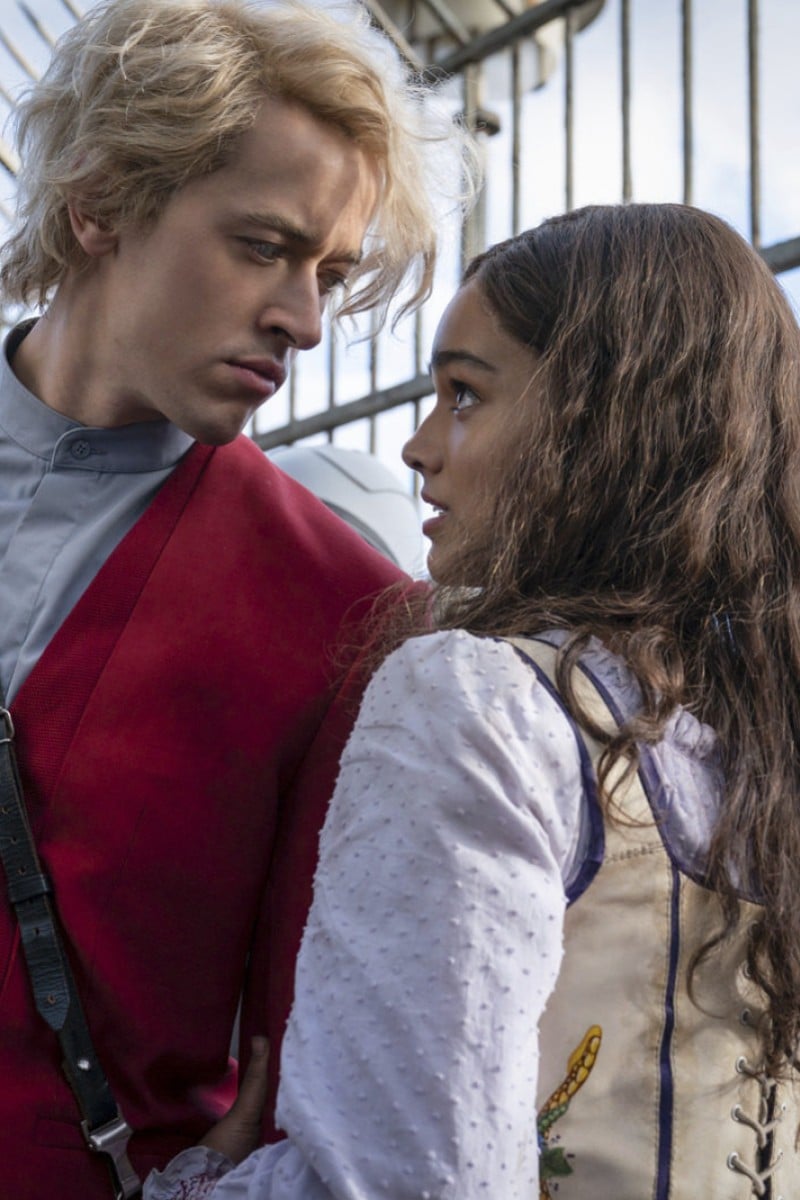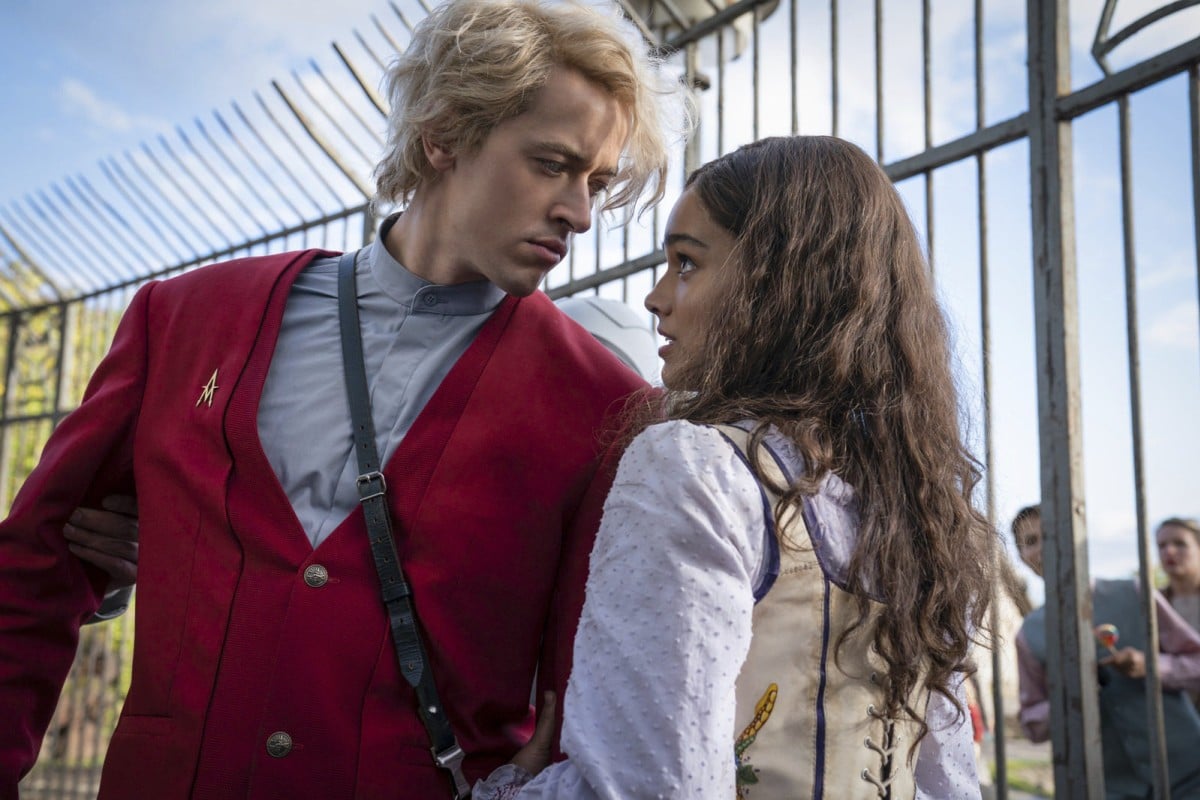
‘The Hunger Games: The Ballad of Songbirds & Snakes’ review: A bold prequel with fantastic cast
- Film stars Rachel Zegler as the defiant Lucy Gray Baird, Tom Blyth as the ruthless Coriolanus Snow and Viola Davis as wicked gamemaker Dr Volumnia Gaul
- Movie serves as a companion to the original trilogy and answers questions about the Games, Panem and the series’ main villain
 Tom Blyth (left) plays Coriolanus Snow, and Rachel Zegler is Lucy Gray Baird. Photo: Lionsgate via AP
Tom Blyth (left) plays Coriolanus Snow, and Rachel Zegler is Lucy Gray Baird. Photo: Lionsgate via APEight years after the release of the last film in Suzanne Collins’ Hunger Games trilogy, the prequel, The Hunger Games: The Ballad of Songbirds & Snakes, has finally arrived to answer a few big questions: Who designed these games, and how did Coriolanus Snow become the ruthless patriarch of Panem?
The prequel is definitely a pleasant surprise. Not only does it serve as the missing piece in the original trilogy, but it also presents a refreshing, primitive blueprint of the Games’ beginnings without the saturated, futuristic dystopian landscapes and technology.
While the previous films focused more on building the world and moving the plot forward, the prequel is character-driven, bringing to life the inner struggles and moral complexities of Snow and other characters.
Based on the book of the same title, The Hunger Games: The Ballad of Songbirds & Snakes goes back in time to the 10th Hunger Games, generations before the birth of Katniss Everdeen. It centres around 18-year-old Snow, revealing more of his backstory. Although Snow comes from a prestigious family in the Capitol, his life is not as privileged as we initially thought.
His father, a military general, died in the war against the Districts, which is also when his family lost the munitions factory that made them rich. Because of this, he understands hunger, poverty, and most importantly, the need to fend for himself and others in situations determined not by choices but by circumstances. There’s no doubt he faced adversity, but he is determined to regain his family’s prosperity and preserve their legacy.
It is the 10th Hunger Games, and the gamemaker wants to try something new: introducing mentors to coach the tributes, win over the citizens of Panem and broadcast the Games like reality TV to drum up emotional investment.
From The Hunger Games to Divergent, 5 tropes in every YA dystopian series
Thanks to his academic excellence at the Academy, the Capitol’s most prestigious school, Snow is chosen to be among the first cohort of mentors. He is alarmed when he is assigned to mentor Lucy Gray Baird from District 12, who drew attention for her defiant behaviour after she was chosen as tribute. As he grows attached to Lucy Gray, things quickly snowball into chaos.
It is evident that the movie was made to understand the arc of the series’ biggest villain, and it succeeded. Although we already know how Snow’s story ends, we often find ourselves rooting for him, hoping he would pull through and act differently.
What’s most impressive are the impeccable casting choices: Rachel Zegler is radiant and has the right energy for the role of Lucy Gray, an enigmatic and charming songbird who can capture the crowd’s attention with her presence and mesmerising voice. Tom Blyth excels in his performance as Snow, a morally conflicted character discovering himself every minute, and Viola Davis shines as the wicked Dr Volumnia Gaul, a manipulative leader with a penchant for mind games and exotic creatures.
The name Lucy Gray pays homage to a poem written by William Wordsworth in 1799, published in his Lyrical Ballads, about the ghost of a young girl lost in a snowstorm, and it’s easy to see the namesake’s influence on the character. Lucy Gray’s entrance on the reaping day, donning the rainbow ruffle dress like “a tattered butterfly in a field of moths”, was a precise portrayal as described in the book. Her bow at the end is a subtle nod to her defiant nature, echoing the spirit of Katniss Everdeen.
The film pays great attention to detail. It is fascinating to see the obvious difference in life and technology in the Capitol 10 years after the uprising, and the dehumanizing, apocalyptic world depicted in the trilogy more than 60 years later. Mentors view the Games using retro monitors and wear Academy uniforms, while a dilapidated amphitheatre serves as the arena, with an entrance similar to a turnstile at a Disney ride.
All in all, the Hunger Games prequel is an essential piece to the story and gives new insight into Snow, the impact of war and the beginning of the Games (including the origin of the iconic song, “The Hanging Tree”, and Snow’s love for roses).
Unlike the two-part Mockingjay films, the prequel balances world-building and character development well. Snow’s coming of age also prompts the question: What are the Games for, and how does the violence in the arena compare to the world at large?
